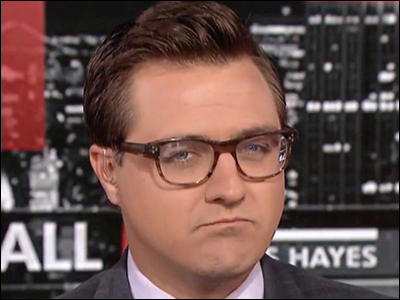- Aug. 31, 2019
- 2 min read
During his dissertation, [MSNBC’s Chris] Hayes made the astounding conclusion that if the Electoral College were not a part of the U.S. Constitution, it would be unconstitutional.
— Breitbart, August 31, 2019
QUICK TAKE
Let’s start with the simple proposition that Chris Hayes is a dolt or disingenuous. You’d think that a guy who’s an “expert” on politics would have a fundamental understanding of the Constitution. But Hayes is a leftist, and his analyses are really thinly veiled attempts to push his side’s agenda.
Ever since Hillary lost to Donald Trump in 2016, Democrats have fished for excuses. Hillary being a spectacularly bad candidate never seems to cross their minds. Her reptilian personality turned off voters. Eight years of Barack Obama didn’t help. But those are incidental.
Argue Democrats, Hillary still won the popular vote. Then they turn blue and stamp their feet. It just isn’t fair!
When you look at where Hillary’s votes came from – very blue California, Illinois, New York, et al – you wonder about trifles like ballot box stuffing and illegals voting. Just saying.
The framers designed the Constitution to include indirect elections of presidents – and once, U.S. senators. Why? Because these very wise men were leery of unfettered democracy. They believed that indirect elections (save for the House of Representatives) were a break on the passions and whims of the moment. There is such a thing as a tyranny of the majority. The founders viewed democracy as a feature of republican government, and not the other way around.
Maybe Chris should read Federalist Paper # 68, penned by Alexander Hamilton.
From Federalist Paper # 68:
It was also peculiarly desirable to afford as little opportunity as possible to tumult and disorder. This evil was not least to be dreaded in the election of a magistrate, who was to have so important an agency in the administration of the government as the President of the United States. But the precautions which have been so happily concerted in the system under consideration, promise an effectual security against this mischief. The choice of SEVERAL, to form an intermediate body of electors, will be much less apt to convulse the community with any extraordinary or violent movements, than the choice of ONE who was himself to be the final object of the public wishes. And as the electors, chosen in each State, are to assemble and vote in the State in which they are chosen, this detached and divided situation will expose them much less to heats and ferments, which might be communicated from them to the people, than if they were all to be convened at one time, in one place. [Italics added]
Hamilton’s language is florid, in the style of the late 18th Century. It boils down to this: direct democracy is a threat to the rights and freedoms of the individual. Indirect elections of a “chief magistrate” were a safeguard against tyranny. So was a system of checks and balances in the national government as a whole.
But conceit and power-hunger prevent Chris Hayes and his allies even acknowledging the framers’ concerns. Those concerns are as relevant today as they were in the 1780s.
Protect liberty and rights: keep the Electoral College.
What do you think? Weigh in!

